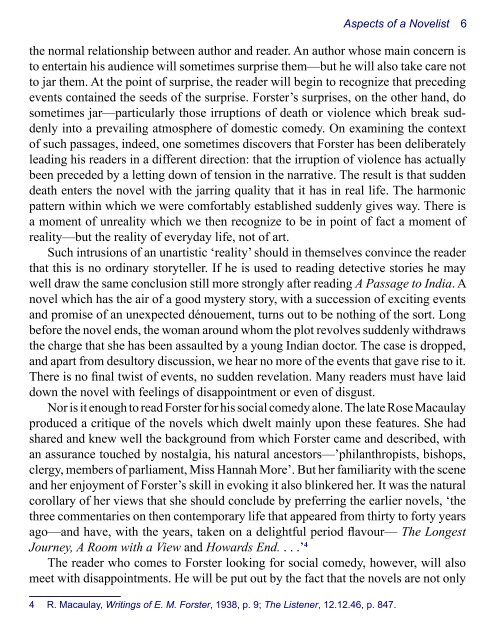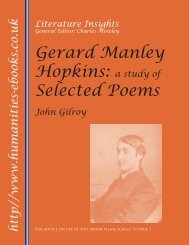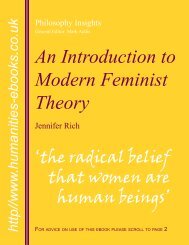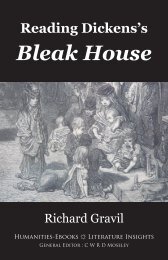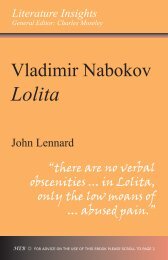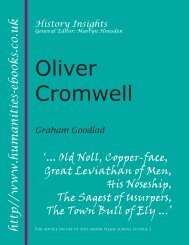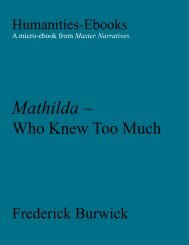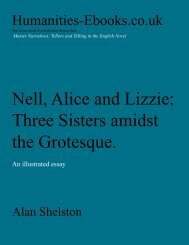The Achievement of E. M. Forster - Humanities-Ebooks
The Achievement of E. M. Forster - Humanities-Ebooks
The Achievement of E. M. Forster - Humanities-Ebooks
You also want an ePaper? Increase the reach of your titles
YUMPU automatically turns print PDFs into web optimized ePapers that Google loves.
Aspects <strong>of</strong> a Novelist <br />
the normal relationship between author and reader. An author whose main concern is<br />
to entertain his audience will sometimes surprise them—but he will also take care not<br />
to jar them. At the point <strong>of</strong> surprise, the reader will begin to recognize that preceding<br />
events contained the seeds <strong>of</strong> the surprise. <strong>Forster</strong>’s surprises, on the other hand, do<br />
sometimes jar—particularly those irruptions <strong>of</strong> death or violence which break suddenly<br />
into a prevailing atmosphere <strong>of</strong> domestic comedy. On examining the context<br />
<strong>of</strong> such passages, indeed, one sometimes discovers that <strong>Forster</strong> has been deliberately<br />
leading his readers in a different direction: that the irruption <strong>of</strong> violence has actually<br />
been preceded by a letting down <strong>of</strong> tension in the narrative. <strong>The</strong> result is that sudden<br />
death enters the novel with the jarring quality that it has in real life. <strong>The</strong> harmonic<br />
pattern within which we were comfortably established suddenly gives way. <strong>The</strong>re is<br />
a moment <strong>of</strong> unreality which we then recognize to be in point <strong>of</strong> fact a moment <strong>of</strong><br />
reality—but the reality <strong>of</strong> everyday life, not <strong>of</strong> art.<br />
Such intrusions <strong>of</strong> an unartistic ‘reality’ should in themselves convince the reader<br />
that this is no ordinary storyteller. If he is used to reading detective stories he may<br />
well draw the same conclusion still more strongly after reading A Passage to India. A<br />
novel which has the air <strong>of</strong> a good mystery story, with a succession <strong>of</strong> exciting events<br />
and promise <strong>of</strong> an unexpected dénouement, turns out to be nothing <strong>of</strong> the sort. Long<br />
before the novel ends, the woman around whom the plot revolves suddenly withdraws<br />
the charge that she has been assaulted by a young Indian doctor. <strong>The</strong> case is dropped,<br />
and apart from desultory discussion, we hear no more <strong>of</strong> the events that gave rise to it.<br />
<strong>The</strong>re is no final twist <strong>of</strong> events, no sudden revelation. Many readers must have laid<br />
down the novel with feelings <strong>of</strong> disappointment or even <strong>of</strong> disgust.<br />
Nor is it enough to read <strong>Forster</strong> for his social comedy alone. <strong>The</strong> late Rose Macaulay<br />
produced a critique <strong>of</strong> the novels which dwelt mainly upon these features. She had<br />
shared and knew well the background from which <strong>Forster</strong> came and described, with<br />
an assurance touched by nostalgia, his natural ancestors—’philanthropists, bishops,<br />
clergy, members <strong>of</strong> parliament, Miss Hannah More’. But her familiarity with the scene<br />
and her enjoyment <strong>of</strong> <strong>Forster</strong>’s skill in evoking it also blinkered her. It was the natural<br />
corollary <strong>of</strong> her views that she should conclude by preferring the earlier novels, ‘the<br />
three commentaries on then contemporary life that appeared from thirty to forty years<br />
ago—and have, with the years, taken on a delightful period flavour— <strong>The</strong> Longest<br />
Journey, A Room with a View and Howards End. . . .’ <br />
<strong>The</strong> reader who comes to <strong>Forster</strong> looking for social comedy, however, will also<br />
meet with disappointments. He will be put out by the fact that the novels are not only<br />
R. Macaulay, Writings <strong>of</strong> E. M. <strong>Forster</strong>, 1938, p. 9; <strong>The</strong> Listener, 12.12.46, p. 847.


